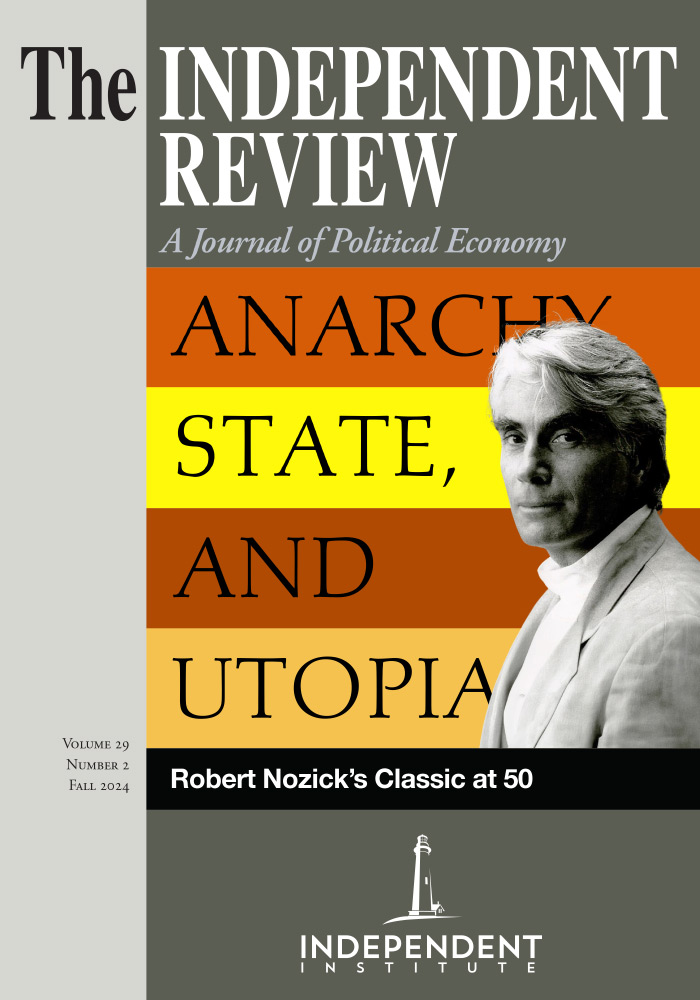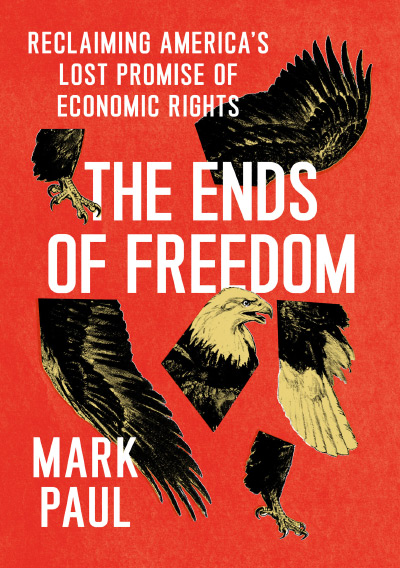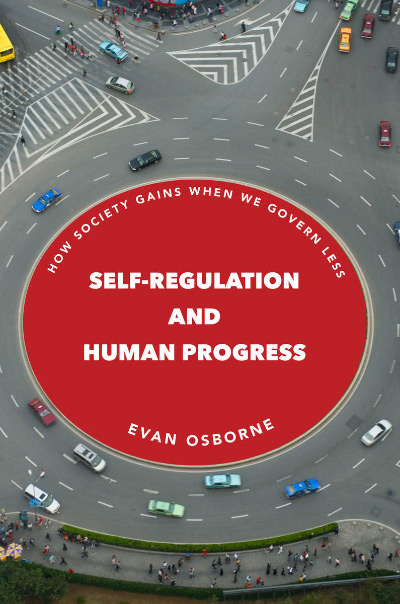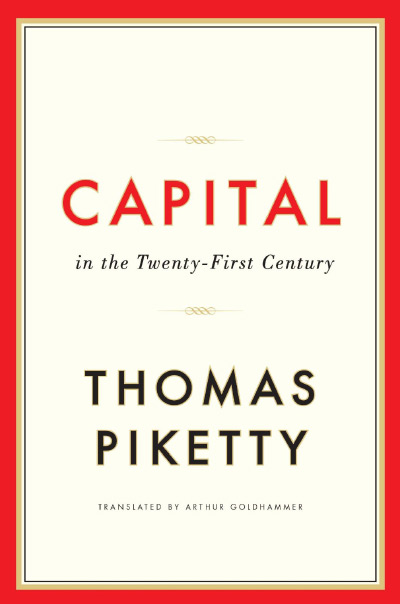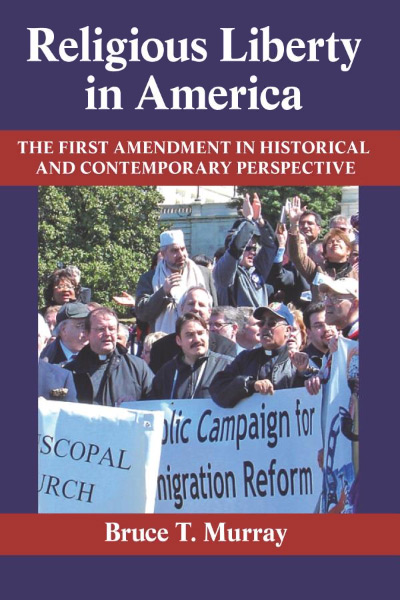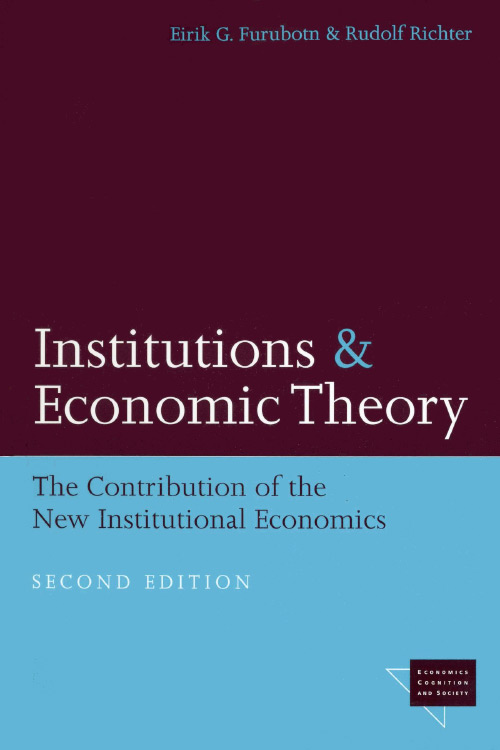I like utopias. They’re lovely bits of fiction. After finishing a fine bit of utopian fiction, however, the real world always beckons.
Mark Paul has put together a top-notch utopian story. In The Ends of Freedom, Paul argues that the economic ills that exist in our sea of abundance are the direct result of intentional policy decisions. Homelessness, poverty, inequality, and other economic problems could be alleviated, if not entirely eradicated, through a bold agenda of reform that includes extending a comprehensive set of positive economic rights to all Americans. In a well-researched excursion through economic history, Paul illustrates how calls for positive freedoms have a long record, dating back to arguments made by some of our founding fathers. He also claims that our current preoccupation with negative freedoms is the result of successful arguments by so-called neoliberal economists like Milton Friedman and F. A. Hayek. It is largely due to their legacy that policymakers often equate free markets and freedom. Additionally, the long shadow of this neoliberal ideology is to blame for the fact that we lack a social welfare state of the sort many other developed nations enjoy.
If this argument makes you cringe, you’re not alone. But before dissecting the problems with his analysis, I’d like to suggest some common ground. Paul is absolutely right that poor policy decisions have played a role in exacerbating some of our most serious social and economic problems. Because of those policy decisions, we have substandard and unaffordable housing options in many locations, despite being a very wealthy nation. Poor policy decisions are at the root of our student loan crisis in the U.S. The dysfunction in our health care and banking sectors, likewise, can largely be attributed to poor policy decisions.
Yet Paul goes beyond arguing that these policy decisions were misguided and says that “America’s social and economic crises are not obscure, unpredictable, or ‘natural’; rather, they stem from intentional policy choices” (p. 5, emphasis in original). He goes on to say that “if U.S. policy makers, at the urging of corporate CEOs and their economist enablers, can adopt a regressive tax code, they can also adopt a progressive one; if policy makers can choose to privatize health care, they can also choose not to” (p. 5, emphasis in original). In a series of six chapters, he lays out how instantiating a series of positive economic rights into our American system would not only alleviate but practically solve these problems. These include (1) the right to work, (2) the right to housing, (3) the right to an advanced education, (4) the right to health care, (5) the right to a basic income and banking, and (6) the right to a healthy environment.
In a final chapter, he admits that “these initiatives and others will require large and permanent increases in the U.S. government’s annual budget” (p. 227), but he argues that as long as GDP growth outstrips additions to the national debt, then these increases in spending won’t be problematic. It’s the ratio of debt to GDP that’s really important, and as long as the denominator continues to grow, we can support a growing numerator. Further, as long as we can encourage the Federal Reserve to keep interest rates low, our cost of borrowing will remain low as well. He also argues for a comprehensive set of public investment and regulation to support his bold economic plan.
However, politics, as Richard Wagner is fond of saying, is a peculiar business; and in every example Paul highlights, it’s an inappropriate tool to address the problems he identifies. In chapter 2 of his book, he lays much of the blame for our current economic ills at the feet of Milton Friedman, F. A. Hayek, and other “neoliberal” economists. Americans’ equation of markets with freedom has created an economic system that doesn’t equally benefit all. Yet in every area he highlights, the most severe problems have arisen because the “market” is terribly corrupted by government intervention.
Consider the “market” for higher education. It is absolutely true that individuals with at least a bachelor’s degree earn more, on average, than those with just a high school diploma (putting aside the fact that many individuals with vocational training can earn a solid six figures without a college degree). It is also true that student debt has risen substantially in recent years, and that the availability of easy, federally backed credit has contributed to an explosion in the cost of college. His solution is to provide free college for all. In addition to making individual students better off, he argues that having a more educated populace will have a variety of beneficial spillover effects for society at large.
What’s missed in his analysis, however, is that we don’t currently have a market in higher education, at least not a free one. Since 2010, total student debt has more than doubled (see this Federal Reserve’s chart). This increase is in large part the result of rule changes initiated under the Health Care and Education Reconciliation Act of 2010, though the problem goes back much further. Back in 1978, the Carter administration passed the Middle Income Student Assistance Act, which allowed all students, regardless of income, to take out subsidized federal student loans. College tuition and fees have risen partly because of these expanded loan programs (Grey Gordon and Aaron Hedlund, August 2022, “Do Student Loans Drive Up College Tuition?” Richmond, Va.: Federal Reserve Bank of Richmond).
So, are the problems in higher education (and the other issues Paul mentions) primarily due to market failure or government failure? The answer is neither ... and both. The real problem is the substantial entanglement of the two sectors. By just blaming the market, Paul is ignoring the substantial problems of government failure. James Buchanan liked to bring up the fallacy of the “emperor’s singing contest.” According to the fable, an emperor held a singing contest, and upon hearing how badly the first contestant sang, immediately declared the second the winner. This is often how market failures are treated. Upon seeing how badly “markets” perform, people often automatically claim that governments can do better.
Yet as Sanford Ikeda (1997, Dynamics of the Mixed Economy toward a Theory of Interventionism, New York: Routledge) explores in his work on the logic of interventionism, once the problems of government involvement in markets are realized, policymakers have two choices. One, they can layer on an additional intervention in an attempt to correct the problems of the first intervention. Or two, they can repeal the original intervention that is wreaking the havoc. The first remedy is the one that Paul champions, though he misdiagnoses the problems as originating in the market. The second remedy is seldom tried, since the job of politicians is to use their power to provide benefits for their constituents.
Yet ample literature suggests that many of the problems Paul identifies are actually better handled in environments where markets dominate. If we use the Economic Freedom of the World index (EFW) as a proxy for the relative degree to which economies are organized according to market principles, we can test whether the economic problems Paul describes are better handled by markets or governments. In “Economic Freedom in the Literature: What Is It Good (Bad) For?” (2022, Vancouver: Fraser Institute), Robert Lawson evaluated all of the available literature that has used the Economic Freedom of the World index, or some part of it, as an independent variable. For every area about which Paul is concerned, evidence suggests that markets solve the problem better than governments. With respect to income and productivity, 72.5 percent of the fifty-one studies included in the analysis found a positive relationship between these variables and economic freedom. The remaining 27.5 percent didn’t find a negative relationship—they found no clear relationship at all. A similar story can be told for economic growth, entrepreneurship, innovation, labor market outcomes, environmental outcomes, and a variety of other normatively good things. Markets aren’t perfect, but they do much more good than harm in the world.
Paul is right to point out the manifold economic problems that plague modern Americans. Simply saying, as many optimists do, that things have gotten better in recent years ignores the real hardships that many still endure. Just as government action is not a silver bullet for these issues, so too are markets not a perfect solution. Both markets and governments fail. Yet in his haste to correct the ills of society, Paul ignores the failures of governments. Despite being a trained economist, he also ignores the role that prices play in coordinating economic activity, as well as the problems that would ensue by replacing the price mechanism with government solutions. We don’t live in a perfect world, but at least markets have built-in corrective mechanisms and are nimble enough to change course when inevitable problems emerge.
Despite its faults, or really because of its faults, this book should be on your reading list. It illustrates how both fans and critics of free markets can look at the same problems through different lenses and reach radically different conclusions. In order to counter the rising tide of progressivism, it’s important to thoughtfully engage with the academic scribblers who are working in this space. Paul is well intentioned and thorough in his analysis, which is all the more reason we should take his arguments seriously and push back against them vigorously.

